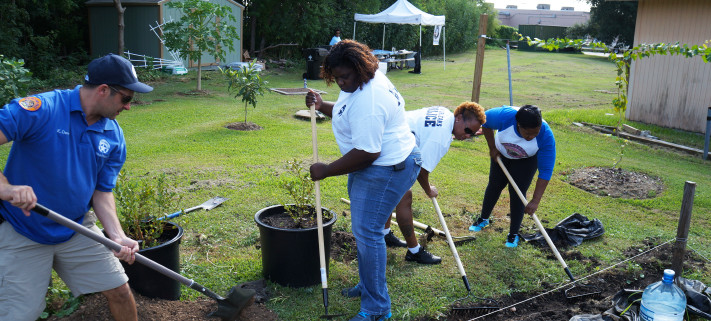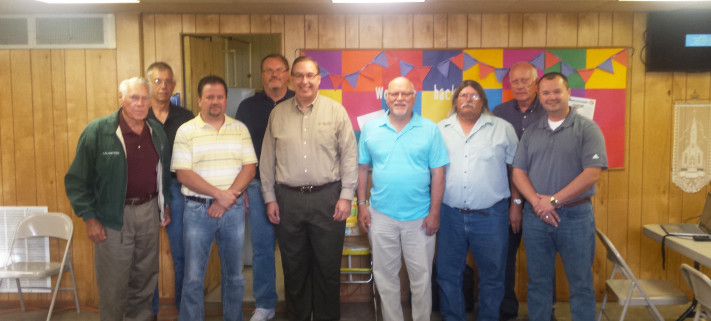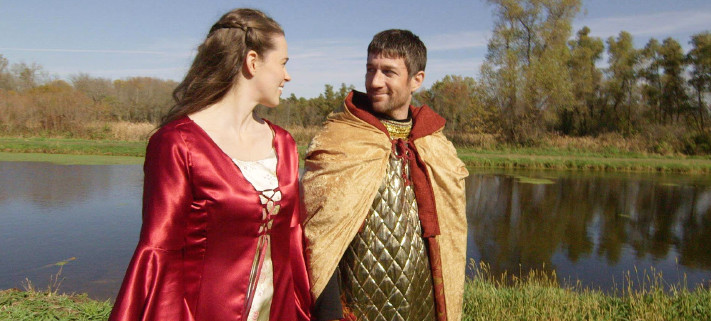Confessions of Faith: Ralston
An atheist who disregarded the Bible discovers the saving message of the Scriptures.
Amanda Klemp
Brian Ralston went in ready for a fight he was confident he’d win. But when he started posing his surefire talking points, the pastor always had a Scripture-based response.
“I thought the perfect argument was ‘you have to believe every single word in that book is true, because if you don’t believe every single word is true, then you can’t tell me who is smart enough to say what is right or wrong,’ ” says Ralston, remembering his skepticism before that first meeting. “I thought I’d just cross my arms and wait for him to question his whole philosophy on life.”
But that was before he really heard and studied the Word of God at St. Paul, Muskego, Wis.
ZERO INTEREST IN CHURCH
Ralston grew up with a father who is a confirmed atheist and a mother who took her husband’s lead regarding religion, or lack thereof, in the home. God and church were not part of Ralston’s life.
Ralston says, “My dad is to this date a confirmed atheist. He has zero interest and thinks anything church-related is about the want of your money rather than concern about your salvation.” Ralston followed in his father’s footsteps in these beliefs.
When he was younger, Ralston pursued an education in science and was convinced his understanding of the natural world through evolution trumped everything the Bible says about our world and lives.
He was in his twenties when he met Jennifer, his wife of ten years. Jennifer wasn’t raised going to church either, and religion was not part of their life together. After the wedding came two children, a son, Jacob, now 8, and a daughter, Madelyn, 7.
A DIFFERENT LOOK AT SCRIPTURE
It wasn’t until Ralston started to think about school for his small children that he even stepped foot into St. Paul a little over five years ago. A friend suggested to Ralston that St. Paul’s School was the best in the area and he should look at it for his own children entering preschool. That interest in his children’s academic education eventually led to his own spiritual education.
Ralston and his wife ultimately decided they wanted to send their children to St. Paul’s School. They also knew that if they joined the church, they’d get a break on tuition. In what, he admits, was initially a purely financial decision, they set up their first meeting with the pastor at St. Paul.
At the time Ralston considered himself an atheist, and he thought he was going to turn this pastor’s world upside down with his arguments.
Ralston says, “In my pre-Christian days I would use what were man-made mistakes to disregard the Bible because people couldn’t agree.
“That’s what I used to reinforce my own thinking,” he explains. “They can’t even agree what’s in [the Bible]; how am I supposed to live my life following the principles they can’t even come to consensus on as Christians and people who have studied the Bible their entire life?
“I used that as a lot of justification for disregarding [the Bible], and it took the cycle of events and the providence of God that brought me here before I understood that I was collateral damage of all those people who didn’t understand and that I blamed the Word of God, not the people who are misunderstanding it,” says Ralston. “Then my eyes were opened to sit down and look at it more in depth.”
Ralston has since studied the Scriptures and has a goal to read the entire Bible. He finds himself particularly drawn to Jesus’ parables. “The relevance of Scripture today, despite its age, reinforces that it is timeless,” he says. “A lot of people think it’s antiquated and old fashioned. It’s more current every day than it was the day before, in my opinion.”
Ralston doesn’t report a “life-changing” moment, trauma, or tragedy in his life that prompted him to look at Scripture. He’s a typical law-abiding family man who grew up in a typical home. But now he knows that he’s a saved child of God. He has something more than he had before. He knows it happened because the Holy Spirit worked in his heart through the message of the Scriptures. God’s providence brought him and the Bible together. When he began to look through the Scriptures, things changed.
From the first one-hour meeting with the pastor to the required membership class, all the time the Holy Spirit was working in Ralston’s heart. After completing the membership class, he had his children baptized. But he and Jennifer did not get baptized right away because he wanted to be sure he approached his baptism with the appropriate reverence. Eventually, in a conversation with his wife, Ralston said if his birthday landed on a Sunday that particular year, he would get baptized. It did, so he and his wife were both baptized on his birthday a few years ago.
A NEW INTEREST IN OUTREACH
Ralston says he doesn’t necessarily feel like his life as a husband, father, and employee changed outwardly, but “it has changed the way I view my place in the world more so than it has changed how I view myself.” He explains that he’s noticed a bigger capacity for forgiveness, patience, and recognizing the plank in his own eye before pointing out the speck in someone else’s. He tries to take on a “what would Jesus do” attitude in all he does.
“Once I realized the expectations that as a Christian you should try to be Christlike—you should want to live your life in a way that reflects Christ—I knew there’s no way I can live that. But that’s why I need Jesus,” says Ralston. Forgiven by Jesus, he can forgive. Loved by Jesus, he can love selflessly. He’s motivated by Christ to be Christlike.
Since Ralston and his family joined St. Paul, they have shared the saving message with his wife’s parents, who have also joined the church. His parents have not reached that point yet, but he says that he, along with his wife and children, continue to share the good news with them. He prays that one day his parents might know their Savior as well.
He says, “I literally thank God every day for St. Paul’s and the understanding and trueness of what they teach—it aligns perfectly with Scripture.”
Amanda Klemp, WELS web content manager, is a member at Living Word, Waukesha, Wisconsin.
SUBMIT YOUR STORY
Do you have a manuscript, idea, or story from your own life you’d like to share for use in Forward in Christ or on wels.net? Use our online form to share it to our editorial office for consideration.
SUBSCRIBE TO FORWARD IN CHRIST
Get inspirational stories, spiritual help, and synod news from Forward in Christ every month. Print and digital subscriptions are available from Northwestern Publishing House.
Author: Amanda Klemp
Volume 102, Number 12
Issue: December 2015
Copyrighted by WELS Forward in Christ © 2021
Forward in Christ grants permission for any original article (not a reprint) to be printed for use in a WELS church, school, or organization, provided that it is distributed free and indicate Forward in Christ as the source. Images may not be reproduced except in the context of its article. Contact us










